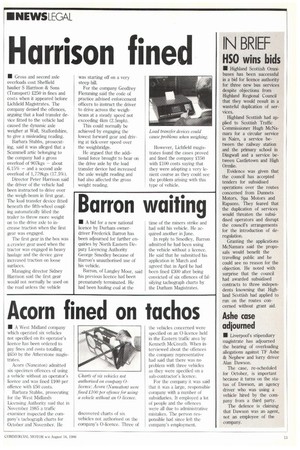Harrison fined
Page 15

If you've noticed an error in this article please click here to report it so we can fix it.
• Gross and second axle overloads cost Sheffield haulier S Harrison & Sons (Transport) £250 in fines and costs when it appeared before Lichfield Magistrates. The company denied the offences, arguing that a load transfer device fitted to the vehicle had caused the dynamic axle weigher at Wall, Staffordshire, to give a misleading reading.
Barbara Stubbs, prosecuting, said it was alleged that a Scammell artic belonging to the company had a gross overload of 907kgs — about 6.15% — and a second axle overload of 1,779kgs (17.5%).
Director Peter Harrison said the driver of the vehicle had been instructed to drive over the weigh-beam in first gear. The load transfer device fitted beneath the fifth-wheel coupling automatically lifted the trailer to throw more weight on to the drive axle to increase traction when the first gear was engaged.
The first gear in the box was a crawler gear used when the tractor was engaged in heavy haulage and the device gave increased traction on loose surfaces.
Managing director Sidney Harrison said the first gear would not normally be used on the road unless the vehicle was starting off on a very steep hill.
For the company Geoffrey Flemming said the code of practice advised enforcement officers to instruct the driver to drive across the weighbeam at a steady speed not exceeding 4km (2.5mph).
This could normally be achieved by engaging the lowest forward gear and driving at tick-over speed over the weighbridge.
He argued that the additional force brought to bear on the drive axle by the load transfer device had increased the axle weight reading and had also affected the gross weight reading. However, Lichfield magistrates found the cases proved and fined the company £150 with £100 costs saying that they were adopting a very lenient course as they could see the problem arising with this type of vehicle.




































































